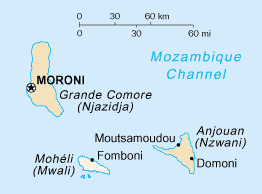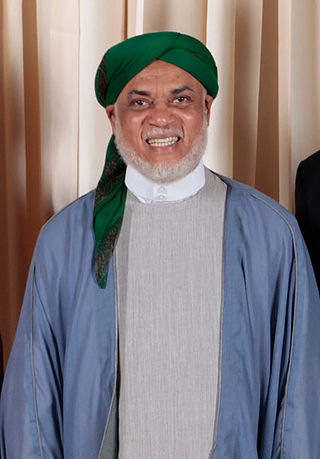
Anjouan is an autonomous volcanic island in the Comoro Islands in the southwestern Indian Ocean, part of the Union of the Comoros. It is known in Shikomori as Ndzuani, Ndzuwani or Nzwani, and, until the early twentieth century when the name fell out of general use, in English as Johanna. Historically it was also called Hinzuan or Hanzoan.

Azali Assoumani is a Comorian politician and military officer who has served as the President of the Comoros from 2002 to 2006 and again since 2016, except for a brief period in 2019. He became head of state after staging a coup d'état in 1999 and was elected president in 2002, 2016, 2019 and 2024. He also served as Chairperson of the African Union from February 2023 to February 2024.

Mohéli, also known as Mwali, is an autonomously-governed island that forms part of the Union of the Comoros. It is the smallest of the three major islands in the country. It is located in the Indian Ocean off the coast of Africa and it is the smallest of the four major Comoro Islands. Its capital and largest city is Fomboni.

Elections in the Comoros take place within the framework of a multi-party democracy and a presidential system. The President and the majority of the seats in the Assembly of the Union are directly elected.

The unicameral Assembly of the Union of the Comoros is the country's legislative body. It was established in 2004.

Presidential elections were held in the Comoros on 16 April and 14 May 2006. As it was the turn of the island of Anjouan to hold the union presidency, a primary election was held in Anjouan on 16 April, prior to a national election on 14 May. The result was a victory for Ahmed Abdallah Mohamed Sambi, who received 58% of the vote in the national election.

Sayyid Ahmed Abdallah Mohamed Sambi is a Comorian Islamic leader and politician, and former President of Comoros. He is popularly known as 'Ayatollah'. After easily winning the 14 May 2006 presidential election with 58.02% of the national vote, Sambi was inaugurated as President of the Union of the Comoros on 26 May 2006. It was the first peaceful transfer of power in the history of the Comoros.

The President of Anjouan is the head of Anjouan, one of the three islands of the Union of Comoros. The position was firstly established in 1997 after the Declaration of independence of Anjouan. Secondly the position became President of the autonomous island of Anjouan following the adoption of the Union of Comoros Constitution of 2001.

The invasion of Anjouan, on March 25, 2008, was an amphibious assault led by the Comoros, backed by African Union (AU) forces, including troops from Sudan, Tanzania, Senegal, along with logistical support from Libya and France. The objective of the invasion was to topple Colonel Mohamed Bacar's leadership in Anjouan, an island in the Union of Comoros, when he refused to step down after a disputed 2007 election, in defiance of the federal government and the AU. The Comoros archipelago in the Indian Ocean has had a fractious history since its independence from France in 1975, experiencing more than 20 coups or attempted coups.

Parliamentary elections were held in the Comoros on 6 December 2009, with a second round on 20 December. The elections were originally scheduled for July 2009, but were postponed until after a constitutional referendum was held in May 2009. They were then scheduled to take place on 29 November, but were delayed again. The result was a victory for the Baobab Movement, a coalition supporting President Ahmed Abdallah Mohamed Sambi.

Ikililou Dhoinine is a Comorian politician who was the President of the Comoros from 2011 to 2016; he was a Vice-President of Comoros from 2006 to 2011.

Presidential elections were held in the Comoros on 21 February 2016, with a second round to be held on 10 April 2016, alongside elections for the Governors of the three islands. A re-run of the second round was held in thirteen constituencies on Anjouan on 11 May. Azali Assoumani of the Convention for the Renewal of the Comoros was elected President with 41% of the vote.

The Union for the Development of the Comoros is a political alliance in the Comoros. The party's president is Mohamed Halifa.

Early presidential elections were held in the Comoros on 24 March 2019 alongside regional elections. A second round would have been held on 21 April if required, but incumbent President Azali Assoumani was re-elected in the first round of voting.

Parliamentary elections were held in the Comoros on 19 January 2020; in constituencies where no candidate received a majority, a second round was held alongside local elections on 23 February. The elections were boycotted by the main opposition parties, including the two largest parties in the outgoing Assembly, the Union for the Development of the Comoros and Juwa Party, in protest at constitutional reform and political repression, The result was a landslide victory for President Azali Assoumani's Convention for the Renewal of the Comoros, which won 20 of the 24 elected seats.
Said Ali Kemal was a Comorian politician. He was the son of Prince Saïd Ibrahim Ben Ali and the grandson of Sultan Said Ali bin Said Omar of Grande Comore.
Mohamed Ali Soilihi is a Comorian politician from Grande Comore who served as Vice-President of Union of the Comoros for Ministry of Finance, Budget, Foreign Trade and Economy of Comoros. He served in the cabinet of Ikililou Dhoinine from May 2011 to May 2016.
Mohamed Hassanaly sometimes written as Mohamed Hassan Ali was a politician of the Comorian island of Mohéli. He serves as the first Vice-President of the Comoros from January 1976. For the 2002 presidency of Mohéli, he lost from his rival Mohamed Said Fazul. After his death he was described as a main national political figure and an iconic leader.

The 2013 Comorian coup attempt was a failed coup d'état in the Comoros against President Ikililou Dhoinine. Motives for the coup include discontent from the dismissals of officials connected with Dhoinine's predecessor Ahmed Abdallah Sambi, such as the head of the army. Former President Sambi, who had backed Dhoinine in the 2010 Comorian presidential election, was sidelined and kicked from his inner circle after the election.











